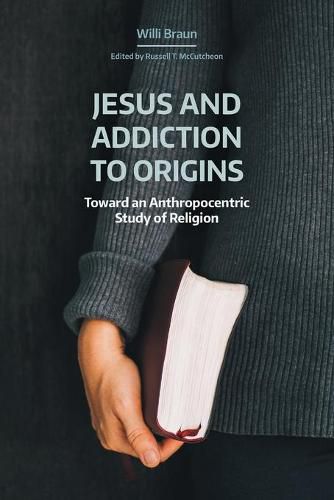Readings Newsletter
Become a Readings Member to make your shopping experience even easier.
Sign in or sign up for free!
You’re not far away from qualifying for FREE standard shipping within Australia
You’ve qualified for FREE standard shipping within Australia
The cart is loading…






This title is printed to order. This book may have been self-published. If so, we cannot guarantee the quality of the content. In the main most books will have gone through the editing process however some may not. We therefore suggest that you be aware of this before ordering this book. If in doubt check either the author or publisher’s details as we are unable to accept any returns unless they are faulty. Please contact us if you have any questions.
This collection of essays constitute an extended argument for an anthropocentric, human-focused, study of religious practices. The basic premise of the argument, offered in the opening section, is that there is nothing special or extraordinary about human behaviors and constructs that are claimed to have uniquely religious status and authority. Instead, they are fundamentally human and so the scholar of religion is engaged in nothing more or less than studying humans across time and place and all their complex existence-that includes creating more-than-human beings and realities. As an extended and detailed example of such an approach, the second part of the book contains essays that address practices, rhetoric and other data in early Christianities within Greco-Roman cultures and religions. The underlying aim is to insert studies of the New Testament and non-canonical texts, most often presented as biblical studies, into the anthropocentric study of religion proposed in the opening section. For a general reading of modern biblical scholarship makes clear the assumption that the Christian bible is a sacred text whose principal raison d'etre is to stand, fetish-like, as the foundational and highest authority in matters moral, ritual or theological; how might we instead approach the study of these texts if they are nothing more or less than human documents deriving from situations that were themselves all too human? Braun’s Jesus and Addiction to Origins seeks to answer just that question-doing so in a way that readers working outside Christian origins will undoubtedly find useful applications for the people, places, and historical periods that they study.
$9.00 standard shipping within Australia
FREE standard shipping within Australia for orders over $100.00
Express & International shipping calculated at checkout
This title is printed to order. This book may have been self-published. If so, we cannot guarantee the quality of the content. In the main most books will have gone through the editing process however some may not. We therefore suggest that you be aware of this before ordering this book. If in doubt check either the author or publisher’s details as we are unable to accept any returns unless they are faulty. Please contact us if you have any questions.
This collection of essays constitute an extended argument for an anthropocentric, human-focused, study of religious practices. The basic premise of the argument, offered in the opening section, is that there is nothing special or extraordinary about human behaviors and constructs that are claimed to have uniquely religious status and authority. Instead, they are fundamentally human and so the scholar of religion is engaged in nothing more or less than studying humans across time and place and all their complex existence-that includes creating more-than-human beings and realities. As an extended and detailed example of such an approach, the second part of the book contains essays that address practices, rhetoric and other data in early Christianities within Greco-Roman cultures and religions. The underlying aim is to insert studies of the New Testament and non-canonical texts, most often presented as biblical studies, into the anthropocentric study of religion proposed in the opening section. For a general reading of modern biblical scholarship makes clear the assumption that the Christian bible is a sacred text whose principal raison d'etre is to stand, fetish-like, as the foundational and highest authority in matters moral, ritual or theological; how might we instead approach the study of these texts if they are nothing more or less than human documents deriving from situations that were themselves all too human? Braun’s Jesus and Addiction to Origins seeks to answer just that question-doing so in a way that readers working outside Christian origins will undoubtedly find useful applications for the people, places, and historical periods that they study.